It has long puzzled me why Germany are not also considered as founders. It is even more confusing as Sweden and Spain are included in the list, although they did not attend the opening meetings either. What is more, Spain did not have a national association until the Spanish Football Federation (RFEF) was founded in 1909.
A detailed examination of the circumstances suggests there may be scope to challenge FIFA's assertion that it was established by just those seven nations, and that Germany should also be recognised.
In May 1904, a number of football federations were invited to Paris by French football administrator Maurice Robert-Guérin, who drafted a cooperation agreement (described as a treaty), and the original articles of the FIFA Statutes. These were ratified in the course of the historic three-day Congress which was attended by just eight men, from whom the first FIFA committee was chosen.
The French governing body of sport, the Union des Sociétés Françaises de Sports Athlétiques (USFSA), hosted the meeting at their offices at 229 rue St Honoré in central Paris. Somewhat surprisingly, despite FIFA's prominence in world sport, there is no plaque or indication that such an important event took place there; there are shops at street level, with offices and apartments above. At the entrance to the courtyard there is a Paris History info panel, but it only commemorates a medieval convent which stood on the site.
Sitting alongside Robert-Guérin was André Espir, secretary of the USFSA, who took the minutes. There were two representatives of the Belgian sports body, the Union Belge des Sociétés de Sports (UBSSA), Louis Muhlinghaus and Max Kahn. Also in attendance were Ludvig Sylow of the Dansk Boldspil Union (DBU), Cornelis 'Carl' A W Hirschman of the Nederlandsche Voetbal Bond (NVB) and Victor E Schneider of the Association Suisse de Football (ASF). They were all relatively young men, four of them in their twenties.
By prior agreement, Sylow represented by proxy the interests of Sweden’s Svenska Bollspells Förbundet (SBF) while Espir performed the same function for the Madrid Football Club (now Real Madrid), who had sent a letter of apology from Spain.
However, there was no German representation, despite Germany being invited as one of the strongest European football nations. The Congress had been arranged at fairly short notice, and this is where fate conspired against the Deutscher Fussball Bund (DFB) as it coincided with their own annual congress and elections, held in Kassel. Nonetheless, they wanted to send a delegate to Paris and nominated Dr Gustav Manning, who had been a founding member of the DFB in 1900 although he was no longer on its board.
Manning was unable to travel - there is a suggestion that he missed a ferry connection, perhaps from England - and DFB president Dr Ernst Karding sent a telegram in time for the opening FIFA meeting to say that Manning would be replaced by Philipp Heineken. However, he too failed to make it to Paris, for reasons unknown.
When Dr Karding realised that there would be no German delegate present, on Monday he sent a further telegram which confirmed the DFB's support and its agreement in principle to the statutes, a decision that had just been made in Kassel. The minutes stated 'Germany subscribes to the Congress' [French original: 'L'Allemagne adhère au Congrès']. Yet despite this, Germany has never been recognised as a founder of FIFA.
On the other hand, Madrid Football Club's letter requesting a proxy somehow carried more weight than a national federation sending a clear message of intent, and Spain has always been credited as a founder.
Now, over a century later, there is a case for FIFA retrospectively acknowledging Germany's role in its creation. Of course, the question has to be asked: does it matter? I believe it does, as it is important to celebrate our sporting heritage and give due recognition to football's pioneers.
Click here to read a full transcript of the minutes, translated into English.
The missing delegates
What of the two German delegates who failed to reach Paris? They both have fascinating stories, in particular Dr Manning. By an extraordinary twist of fate, he did make it onto the FIFA executive committee – over 40 years later, and for a different country!
In 1905, a year after he should have attended the first FIFA congress, he emigrated to the USA and anglicised his name even further as Dr G (or Gus) Randolph Manning. He continued to be heavily involved in soccer and in 1913 he was the driving force behind the foundation of the United States Football Association and was elected its first president. He also developed his medical career and was an eminent gastroenterologist in New York, while serving in the US Army reserves.
His commitment to football remained constant and in 1948, a mere 44 years after he should have attended that meeting in Paris, he was the first American to be elected to the FIFA Executive Committee. He attended the 1950 FIFA Congress, and died in 1953. Manning is buried in Arlington Cemetery and has been inducted into the US Soccer Hall of Fame.
Philipp Heineken (no connection with the beer industry) also led a wandering life. He was born in 1873 in New York, where his father was a jewellery maker. The family returned to Germany after his father died and he became a football enthusiast in Bad Cannstatt, a suburb of Stuttgart, initially playing rugby. He helped the spread of football by translating the rules of the different codes from English into German, launched a football magazine and published one of the first German football yearbooks. As a student he was one of the founders of FV Stuttgart (which later merged with Cannstatt to form VfB Stuttgart). He was a vice-president of the DFB and sat on the German Olympic Committee, frequently travelling abroad.
Then in 1910 he walked out on his wife and daughter and headed back to New York, working as an electrical engineer, living on his own. But after the Second World War he suddenly turned up at his daughter’s door and they were reconciled. He remained in Stuttgart and died there in 1959.
FIFA's seven founding fathers
Maurice Robert-Guérin (1876-1952)
André D Espir (1879-c1950)
Louis Muhlinghaus (1870-1915)
Max Kahn (1871-1959)
Ludvig Sylow (1861-1933)
Cornelis 'Carl' A W Hirschman (1877-1951)
Victor E Schneider (1876-1948).
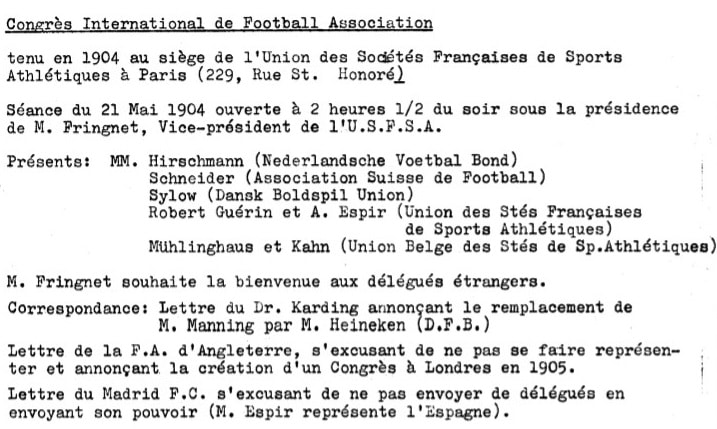
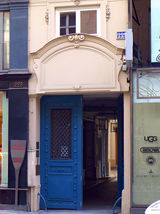
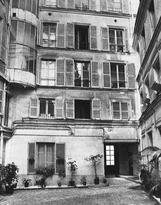
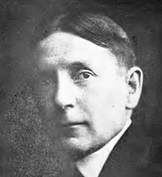
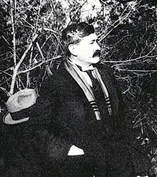
 RSS Feed
RSS Feed